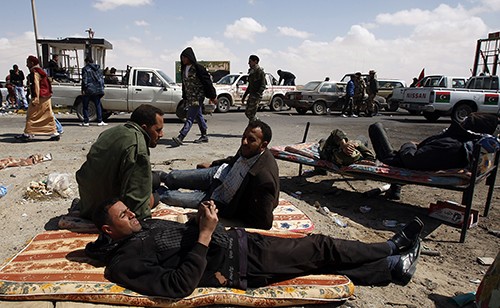WASHINGTON — The Pentagon said it would soon withdraw fighters and ground attack planes from the North Atlantic Treaty Organization-led air campaign in Libya, a move that U.S. lawmakers warned could make the airstrikes less effective in preventing Col. Moammar Gadhafi’s forces from attacking opposition-held areas.
But the U.S. is keeping combat aircraft, including AC-130s and A-10 ground attacks planes, on “”standby”” in case the operation’s Canadian commander, Lt. Gen Charles Bouchard, requests U.S. help, said Adm. Mike Mullen, the chairman of the joint chiefs Thursday. He he said the U.S. is not ruling out sending U.S. warplanes back into the air over Libya if NATO proved ineffective at halting Gadhafi’s forces from advancing.
The Obama administration has planned since the air campaign began two weeks ago for U.S. forces to shift to a support role, while warplanes from European allies assumed the bulk of the combat sorties. But with Gadhafi’s troops regaining the offensive against beleaguered rebels, it has deepened questions about whether NATO can handle the mission without U.S firepower.
“”Your timing is exquisite,”” a sarcastic Sen. John McCain, R-Ariz., warned Defense Secretary Robert M. Gates at an Armed Services Committee hearing. “”At a time when the Gadhafi forces have literally, tragically, routed the anti-Gadhafi forces, that’s when we announced that the United States was abdicating its leadership role and is removing some of the most valuable assets that could be used to great effect.””
Gates replied that “”it remains to be seen”” whether NATO will prove capable of handling the combat mission without U.S. participation and of sustaining the number of strike sorties against Gadhafi’s forces.
Gates and Mullen were testifying at daylong hearings on Libya during which lawmakers from both parties complained that the White House had failed to set clear goals for the air operation and could be facing a protracted stalemate if Gadhafi is able to hold on to power.
Gates conceded that a stalemate is one possible outcome and he acknowledged under questioning that the U.S. “”has no contingency plan”” other than “”keeping the pressure on”” if Gadhafi continues to consolidate his position.
In his strongest language since the U.S. deployed warplanes to protect Libyan civilians, Gates ruled out sending any U.S. forces to Libya “”as long as I’m in this job”” — a viewpoint that he said President Barack Obama shared. A U.S. official confirmed Thursday that Obama signed a secret finding authorizing the CIA to coordinate with and help the rebels. CIA operatives have been on the ground for weeks, gathering intelligence and providing non-lethal aid to the rebels.
Gates acknowledged the administration is still considering whether to provide arms to the rebels, but he argued that what the opposition forces need most to withstand the assault from Gadhafi’s forces is training and other forms of assistance.
“”What the opposition needs as much as anything right now is some training, some command and control and some organization,”” Gates said. “”That’s not a unique capability for the United States, and as far as I’m concerned, somebody else can do that.””
But, in a sign of the hurdles that the opposition force faces without outside assistance, Mullen estimated that the rebel forces had only 1,000 fighters with formal military training, the rest being untrained civilians. He said that Gadhafi’s outnumbered them tenfold in tanks, artillery and heavy weapons.
Mullen said that the NATO-led air campaign had been hampered in recent days because bad weather had reduced the coalition’s ability to carry out airstrikes. He also said that there were tensions within the 28 members of NATO and other governments involved in the air campaign over whether to escalate the military effort to drive Gadhafi from power.
NATO Secretary-General Anders Fogh Rasmussen, speaking in Stockholm, suggested that there was no agreement within NATO on whether to arm the rebels, despite statements by U.S. and British officials that the U.N. resolution authorizing international intervention allows arming Libyan rebels.









